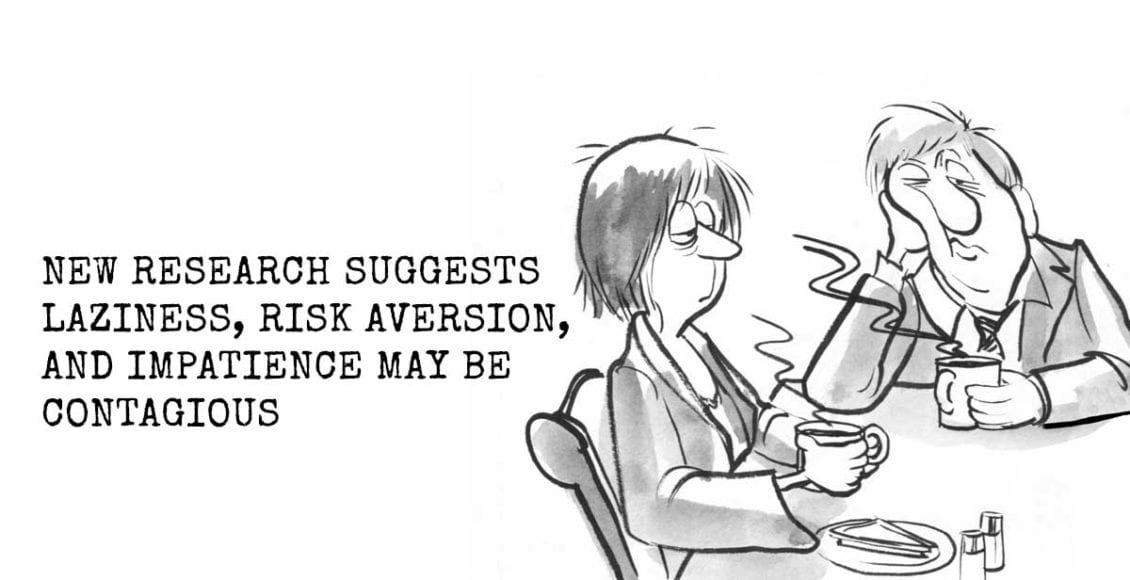New Research Suggests Laziness, Risk Aversion, and Impatience May Be Contagious

There’s a popular school of thought which suggests we become an average of the five people we spend the most time with. Of course there’s a little bit of chicken-or-egg logic here. We are usually attracted to people who share our own values, passions, and lifestyle choices. We choose to spend time with people we love and respect, and in doing so we hopefully pick up on their positive qualities.
Unfortunately, new research suggests that we may absorb their negativity, as well.
A study in France discovered that certain undesirable personality traits – specifically laziness, impatience, and excessive risk aversion – may, in fact, be contagious.
These three traits may seem like an arbitrary assortment, but they actually have quite a lot to do with one another. Specifically, they are all strong motivators when it comes to making decisions. In fact, they are three of the most common reasons that people fail to do what is best for themselves and for others.
Laziness keeps us from engaging in hard work. Impatience keeps us from making wise choices. Excessive risk aversion can stop us from setting and reaching ambitious goals.
As a result, choosing to spend time with people who embrace these qualities can keep us from reaching our full potential.
By contrast, choosing to spend time with friends who work hard, delay gratification, and engage in risk with a balanced sense of wisdom and courage can help us to develop these qualities in our own right. The greatest rewards in life often involve risk, patience, and, of course, lots of hard work. Developing a good attitude towards these ideals can be crucial for success.
These three personality traits have, until now, been considered “entrenched” traits, meaning they are difficult to change, explained Jean Daunizeau, a team leader of the motivation, brain and behavior group at the Brain and Spine Institute (ICM) in Paris and lead author of the study. Until now, the scientific community has thought these three traits to be at least partly genetic. Researchers previously believed that these attitudes should be immune to environmental influences, such as social influence, especially in adulthood. However, the results of this research suggest that this may not be the case. According to Daunizeau, it is very possible that people subconsciously align their attitudes regarding these traits to align with those around them.
After the participants had absorbed the attitudes of the computer model, their own choices began to reflect what they had seen. If they observed the computer model participants being lazy, impatient, or risk-averse, they began to act in the same way. The opposite dynamic held true as well. In essence, the study participants began to mimic the behaviors that they thought they had observed in other people.
So – how do these supposedly “socially contagious” behaviors work?
There are two possible explanations, both of which likely contribute to this effect.
First of all, it is in our nature as human beings to want to fit in with our peers. Our need for social conformity and acceptance is based in evolutionary necessity, and hard to shake from even our most intentional and personal decision-making. It is very possible that we might subconsciously alter these important personal traits to reflect the attitudes of our social environment.
Another explanation is that we imitate the behavior of others because we trust in their capacity to make wise decisions. If everyone around us is making a certain choice, we suspect that they have a good reason to be doing so. When our decision differs from the group, we may wonder if they have information, education, or experience that we do not.
“I hold that a strongly marked personality can influence descendants for generations,” wrote Beatrix Potter. What kind of behavioral imprint are you leaving on your peers? What impact are they having on your decisions? Are you choosing the right friends?

